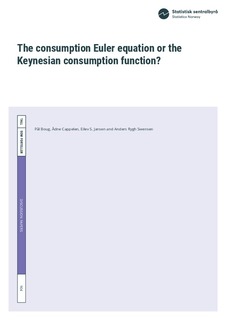The consumption Euler equation or the Keynesian consumption function?
Working paper
Published version
Permanent lenke
http://hdl.handle.net/11250/2600151Utgivelsesdato
2019-04Metadata
Vis full innførselSamlinger
- Discussion Papers [1002]
Sammendrag
We formulate a general cointegrated vector autoregressive (CVAR) model that nests both a class of consumption Euler equations and various Keynesian type consumption functions. Using likelihoodbased methods and Norwegian data, we find support for cointegration between consumption, income and wealth once a structural break around the financial crisis is allowed for. That consumption cointegrates with both income and wealth and not only with income points to the empirical irrelevance of an Euler equation. Moreover, we find that consumption equilibrium corrects to changes in income and wealth and not that income equilibrium corrects to changes in consumption, which would be the case if an Euler equation is true. We also find that most of the parameters stemming from the class of Euler equations are not corroborated by the data when considering conditional expectations of future consumption and income in CVAR models. Only habit formation seems important in explaining the Norwegian consumer behaviour. Our preferred model is a dynamic Keynesian type consumption function with a first year marginal propensity to consume out of income close to 25 per cent.
